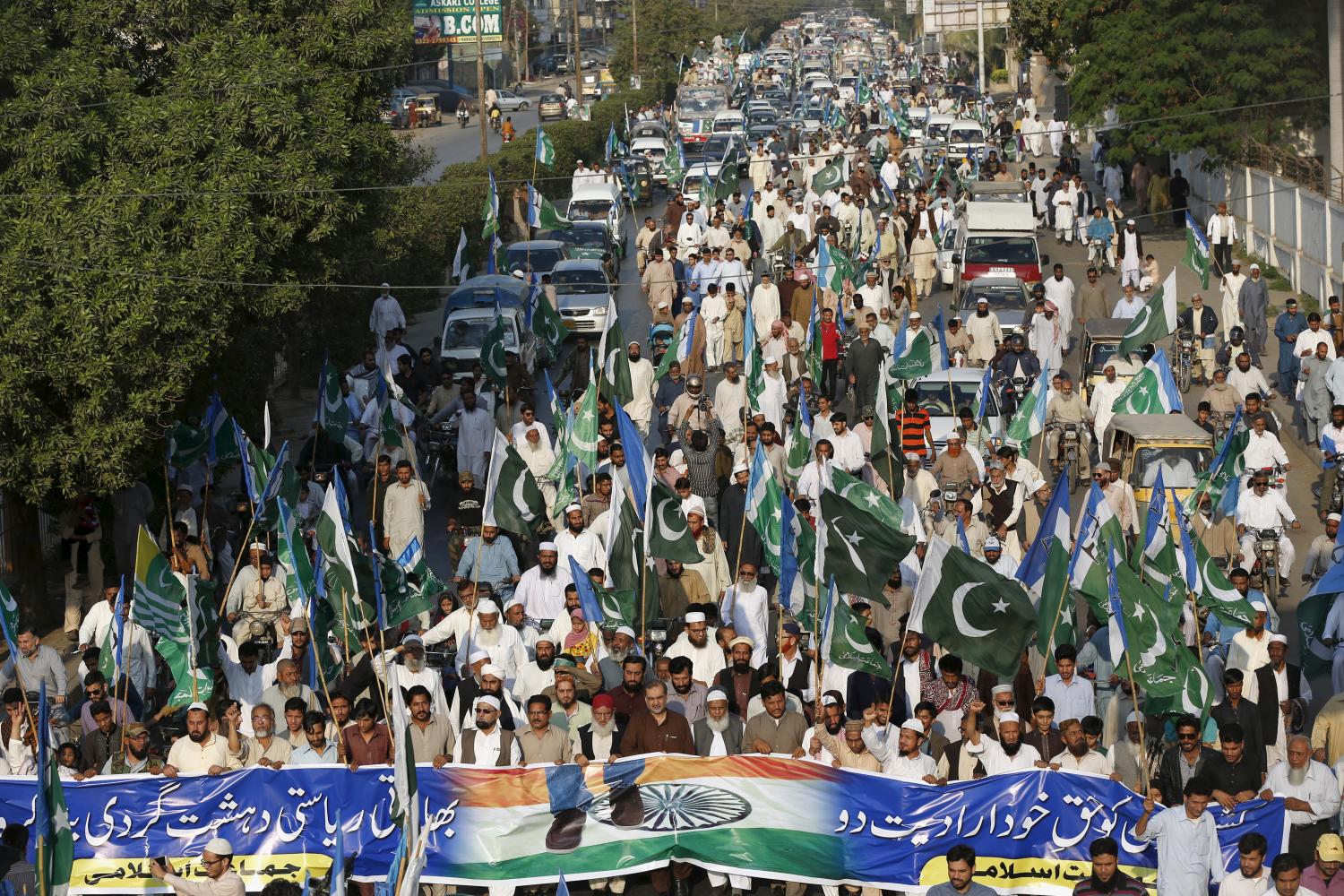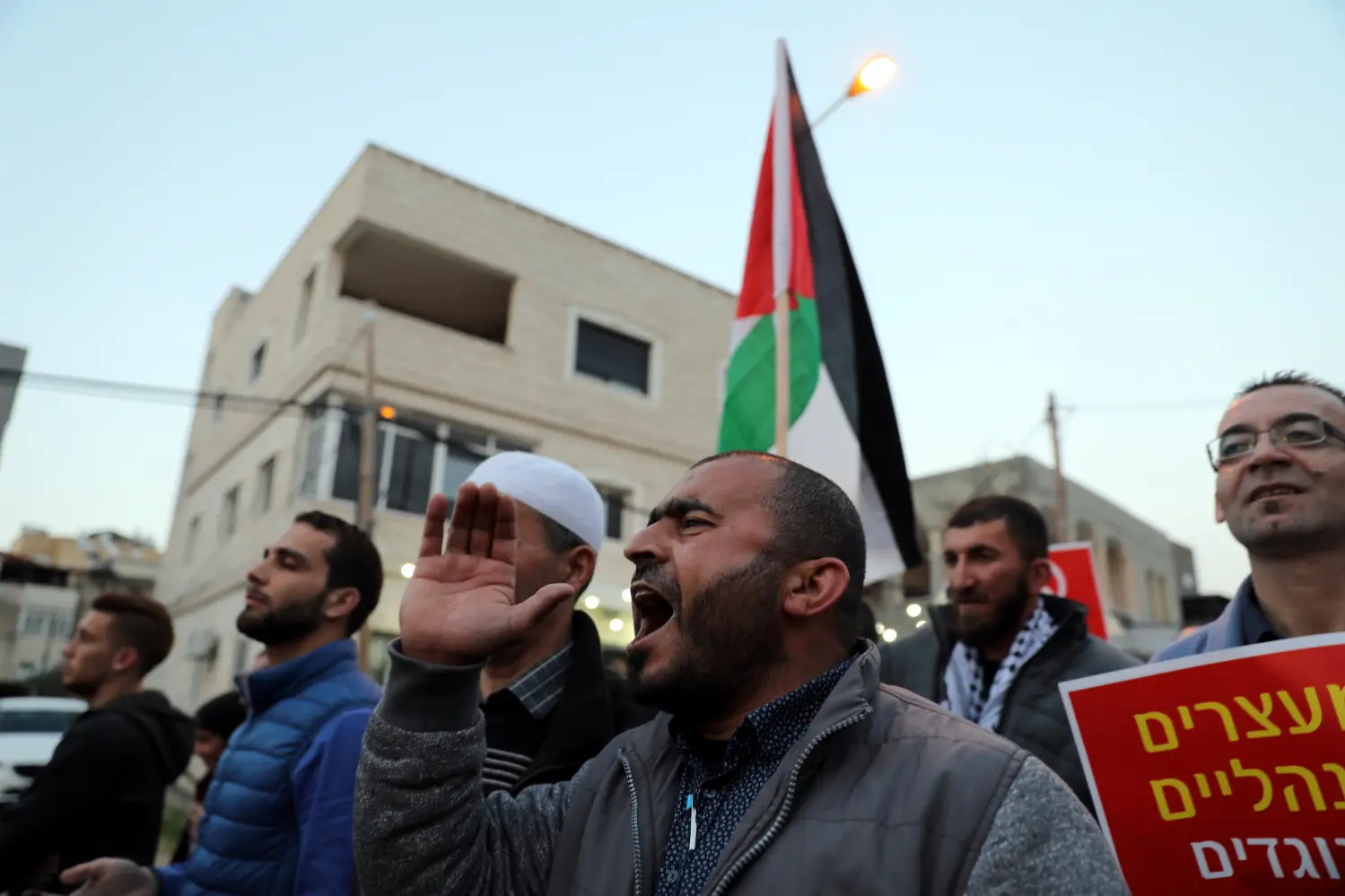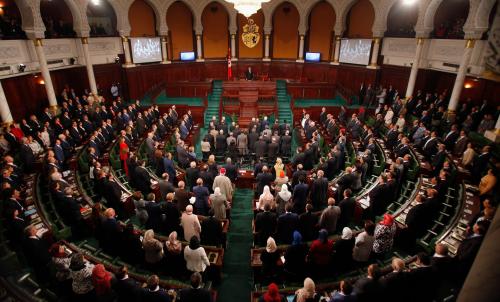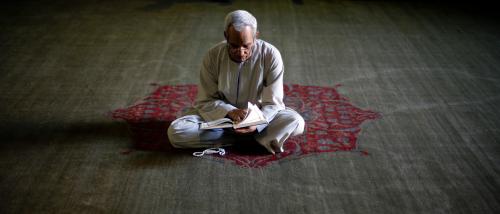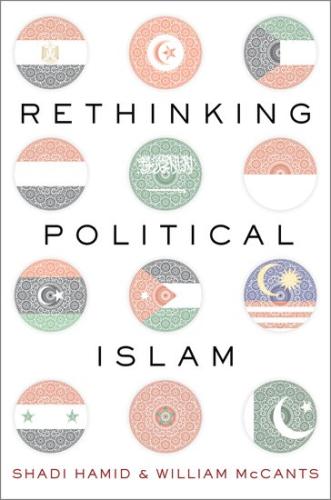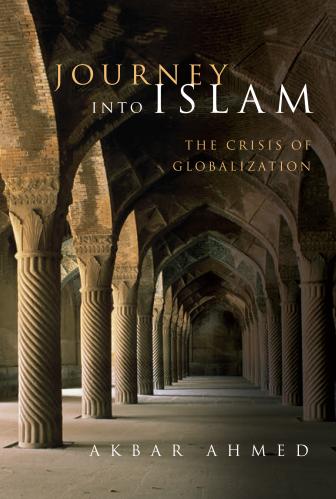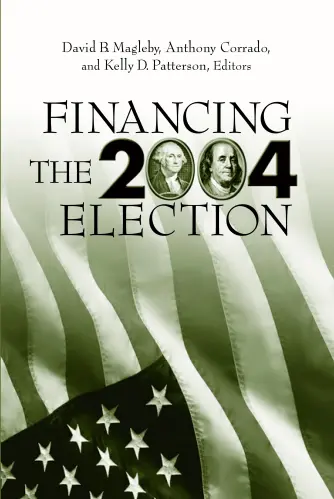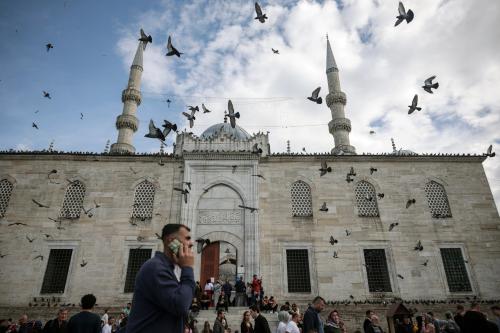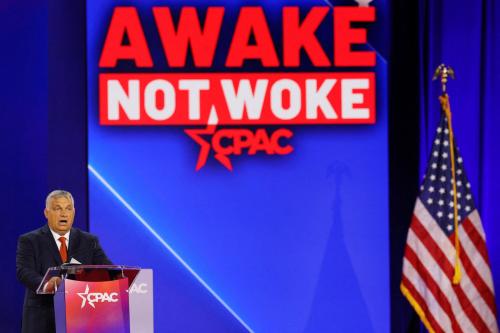Editor’s Note: In “Islamists on Islamism Today,” a new series within Brookings’s Rethinking Political Islam project, we hear directly from Islamist activists and leaders, as they engage in debate with project authors and offer their own perspectives on the future of their movements. Below is an essay by Asif Luqman Qazi, a senior leader in Jamaat-e-Islami, often considered Pakistan’s Muslim Brotherhood analogue and one of the country’s most influential Islamist organizations.
There are a dizzying array of Islamic organizations in Pakistan, a number of which Matthew Nelson covers in his contribution to the Brookings Rethinking Political Islam project. To focus the discussion, I will elaborate my views on Jamaat-e-Islami Pakistan specifically, from my perspective as a senior figure in the movement. Jamaat-e-Islami (“Jamaat,” or the JI) is a mainstream political organization that represents a legalist approach to change. This was the original framework that one traditionally referred to when speaking about “political Islam.” Though this essay is focused on Jamaat, one may attempt to draw conclusions regarding political Islam more generally.
Jamaat-e-Islami Pakistan is distinct among contemporary Islamic movements in that it had strong democratic traditions right from its inception in 1941; has a written constitution to govern its organization; and has always operated within the framework of the country’s constitution. It seeks to bring about societal transformation is through appealing to the intellect, organizing communities, and rallying masses around its program—just like any other political party in the East or West. It believes that Islam provides a universal and dynamic vision of life that is valid and relevant for human welfare in all times and places.
Jamaat adopted the four- point program presented by its founder, Abul A’la Maududi, soon after Pakistan came into existence in 1947. This program encompasses all its activities. They are: reforming the life and mind at the individual level; organizing, motivating, and training virtuous individuals; reforming society more broadly; and reforming the government and political structure. From the beginning, Jamaat made clear that it would operate through legal means and would not resort to secret or underground activities to achieve its objectives. It was in this backdrop that Maududi, along with 33 other prominent Islamic scholars, took a keen interest in the development of Pakistan’s first constitution. These leading scholars—belonging to all recognized schools of thought in Islam—unanimously adopted a 22- point charter to serve as an Islamic basis for the constitution of the country.1 Maududi was subsequently invited by Pakistan’s founding father, Muhammad Ali Jinnah, to deliver five lectures on the foundations of an Islamic system of life. These lectures were broadcasted from official radio channels and elaborated the social, political, and economic underpinnings of a Muslim society that the newly established state was to adopt.
The influence of Islam in Pakistan’s founding
This invitation by Jinnah was in keeping with his vision to establish a system based on Islamic ideology. Although there are elements in Pakistan that would like to paint Jinnah with a secular brush, the fact of the matter is that he made numerous speeches between 1940 and 1947 where he assured the Muslim masses that the Pakistan he envisaged was an Islamic one. For example, in one of his speeches he says, “Pakistan does not mean just independence and sovereignty. It means [an] Islamic ideology that we have to safeguard; it has been conveyed to us as a valuable gift and a treasure.”2 On November 2, 1942, while addressing students at Muslim University in Aligarh, in reference to the proposal to partition the Indian subcontinent, he said: “Let me live according to my history in the light of Islam, my tradition, culture, and language, and you do the same in your zones [of activity].”3 His unequivocal resolve reflected the aspirations of the Muslims of the subcontinent, who had offered sacrifices for a homeland where they fashion their lives according to their faith. The first prime minister of Pakistan, Liaqat Ali Khan, spoke to the Constituent Assembly upon the adoption of the Objectives Resolution. Named for how it lays out the objectives for the future constitution of Pakistan, the Objectives Resolution was adopted in 1949. On the occasion, Khan said:
I would like to remind the house that the Father of the Nation, Quaid- e- Azam [Muhammad Ali Jinnah], gave expression of his feelings on this matter on many an occasion, and his views were endorsed by the nation in unmistakable terms. Pakistan was founded because the Muslims of this subcontinent wanted to build up their lives in accordance with the teachings and traditions of Islam.4
Within this Islamic framework, the Objectives Resolution proclaims Pakistan a democracy with equal rights for all citizens. It pays special attention to safeguarding the rights of non-Muslim minorities. What this means in essence is that although all citizens have equal rights, the state’s ideology will remain Islamic.
What proponents of secularism in Pakistan have presented from other speeches of Jinnah is in fact a negation of theocracy, not Islam. It is important to understand this difference.5 There is no concept of a formalized clergy in Islam with the function of serving as an intermediary between God and man. Islamic principles are liberating and emancipatory, and uphold a form of government that is participatory, not autocratic. This was something that was very clear to both of Pakistan’s founding fathers, Muhammad Iqbal and Jinnah. In fact, the Constituent Assembly of Pakistan presented a workable model for a modern Islamic nation- state under the influence of the narrative developed by Iqbal and Jinnah. At the 1930 Muslim League convention held in Allahabad, Iqbal said: “What, then, is the problem and its implications? Is religion a private affair? Would you like to see Islam as a moral and political ideal, meeting the same fate in the world of Islam as Christianity has already met in Europe?”6 Additionally, Iqbal’s poetry in Urdu and Persian is an elaborate testimony to his vision of Islam as a comprehensive way of life, one inclusive of politics and governance alike.
In his message to the American people, Jinnah said:
The constitution of Pakistan has yet to be framed by [the] Pakistan Constituent Assembly. I do not know what the ultimate shape of this constitution is going to be, but I am sure that it will be of a democratic type, embodying the essential principles of Islam. Today, they are as applicable in actual life as they were 1300 years ago. Islam and its idealism have taught us democracy. It has taught [the] equality of man, justice, and fair play to everybody. We are the inheritors of these glorious traditions and are fully alive to our responsibilities and obligations as framers of the future constitution of Pakistan.7
And in another speech to government functionaries on October 11, 1947, he stated:
The creation of a state of our own was a means to an end and not the end in itself. The idea was that we should have a state in which we could live and breathe as free men and which we could develop according to our own lights and culture, and where principles of Islamic social justice could find free play.8
The Muslims of the subcontinent remained masters of their own destiny for 800 years. They made up more than a quarter of its total population. With their large numbers, and owing to their distinct culture, civilizational heritage, patterns of social organization, and faith, they saw themselves not as a minority community, but as a nation in their own right. Accordingly, Jinnah supported the two-nation theory and the demand for a separate homeland for the Muslims of the subcontinent. The movement for Pakistan was preceded by several social movements spanning two centuries, searching for the soul of Muslim societal life within a broader community of faith and belonging. The educational movements of Deoband, Nadwatul Ulema, and Aligarh College were social expressions of this revivalist quest.
The separation of state and faith, or secularism, is a concept developed in the Western world by virtue of its own peculiar historical process. The West found renaissance and enlightenment by limiting what it considered an oppressive dogmatic theology that had become an obstacle to progress and development. Muslims, on the other hand, have a history contrary to this narrative. For them, faith itself was the source of enlightenment, renaissance, and progress. Their glory era— from the 7th century ad to the 18th century—was marked by a strict observance to their belief system. Enlightened by their faith, they expanded from the Prophet’s—upon whom be peace—city of Medina to three continents. They reached the zenith of knowledge, arts and sciences, warfare and statecraft, trade, industry, and agriculture, and produced a rich treasure of law and jurisprudence. As Israeli scholar Martin Kramer writes, “Had there been Nobel prizes in 1000, they would have gone almost exclusively to Moslems.”9
Their civilizational progress has remained directly proportional to their observance of a dynamic faith, one that provided an enabling environment for advancement. Islam transformed their lives and introduced them to freedom, justice, equality, pluralism, tolerance, human dignity, ethics, and morality. They had a message that was not ethnic, divisive, or sectarian but appealed to all of humanity as one fraternity. Although the political form of this high moral ground was lost to hereditary dynasties 30 years after the death of the Prophet—upon whom be peace—these principles remained part of Muslim societies to various degrees for more than 1,000 years, until their decay in the 19th century.
Today, the Islamic State is an expression of ignorance about, and not an observance of, those glorious traditions. The more Muslims deviated from their faith, the more socially primitive they became. The present-day decay of Muslims is a consequence of deviation from the political and social vision of human life offered up by Islam. Their conditions are further complicated by widespread poverty, illiteracy, ignorance, corruption, and the oppressive rule of an elite class often subservient to Western dominance. Despite these challenges, Islamist movements in particular, and Muslim societies in general, see a reversion to an Islamic ethos and worldview as a path to progress. In it, they see not only a path for salvation in the hereafter but also remedies for their worldly woes. This sustained relevance of Islam to contemporary conditions, or “Islamic exceptionalism” as termed by Shadi Hamid, behooves observers of Muslim societies to cultivate deep insights not just into political Islam, but into Islam itself.10
Islam and the constitution
Islamism in Pakistan has a history of harmony with constitutional and democratic processes. Jamaat, for one, does not demand any radical changes to the constitution of Pakistan. It is, in fact, the constitution’s implementation in letter and spirit that Jamaat has always struggled for. Frequent military interventions have held the full force of the constitution in abeyance for about half of Pakistan’s life as a country. Even those leaders who have been democratically elected have remained more focused on perpetuating their own rule than on functions of governance. Neglecting constitutional imperatives has fomented dissent and mistrust in the country. Had the government fulfilled its constitutional obligations toward the Islamic clauses of constitution, the narrative presented by militants might not have found an audience.
The constitution already has prescribed a framework for all state organs to function within the confines of principles of the Quran and Sunna. It approves of the advisory status of the Council of Islamic Ideology (CII) and the supremacy of parliament in enacting legislation. The CII is a constitutional body that advises the legislature on whether or not a particular piece of legislation is repugnant to Islam. It consists Islamic scholars adhering to the major schools of thought, as well as technocrats. Over the past few decades, the CII has generated an enormous number of reports in response to parliamentary inquiries, but these reports failed to shape legislation due to government neglect. Jamaat is also more than content with the judiciary’s final authority to interpret laws and the constitution. Despite the fact that Islamist parties have had very limited success in parliamentary elections in Pakistan, they have always accepted the results and conceded calmly. Their electoral failure has never wavered their commitment to legalist, constitutional, and gradualist approaches to bringing about political change. They have shown pragmatism and flexibility, particularly during their forays into electoral alliances and coalition governments. Jamaat has remained a coalition partner with Nawaz Sharif’s Pakistan Muslim League – Nawaz (PML- N) and was part of the Muttahida Majlis-e-Amal (MMA), an alliance of Islamic political parties that led regional governments in two provinces. It is currently a coalition partner with Imran Khan’s Tehreek-e-Insaf Party (PTI) in Khyber Pakhtunkhwa province.
Religion and “the pursuit of happiness”
It is essential to understand that Islam is referred to as a “faith” that encompasses the whole of life, and not as a “religion” that concerns itself with a limited set of rituals, ethics, and spirituality. In Pakistan, even non- Islamist or secular political parties acknowledge Islam as their deen (an all-encompassing way of life). Being a faith, Islam is very much concerned with both what is mundane and what is worldly. It is precisely through an engagement with worldly matters that it becomes practical and relevant, rather than an abstract theology. “Life, liberty, and the pursuit of happiness” is as much an Islamic phrase as it is an American one. But the pursuit of happiness has a different cast within an Islamic framework, far from the pursuit of worldly desires. A human being has spiritual and emotional needs apart from physical needs that contribute to his or her happiness. It should not, therefore, come as a surprise that Jamaat engages in politics and governance in addition to its social and religious activities.
Jamaat has been part of several administrations at the local and provincial levels and has contended with the challenges of governance, as well as issues of public welfare and accountability. For long stretches, Jamaat’s mayors have led local bodies in Karachi, Pakistan’s largest metropolitan city with a population of over 23 million, and have even earned appreciation from presidents hostile to the organization, such as Pervez Musharaf. The World Bank has acknowledged provincial ministers of Jamaat in Khyber Pakhtunkhwa province for their integrity and performance.11 A whole host of issues make up its political agenda: education, health care, agriculture, youth employment, ensuring a continuous supply of electricity and other public utilities, and rooting out corruption.
There are divergent views among Jamaat members on the question of whether the organization should enter into coalitions with other parties. While some are of the view that remaining inside the corridors of power is useful to gain political influence, others think that we should enter into coalitions only when we are in a leading role to influence decisions. What distinguishes Jamaat’s leadership at various levels is its religious zeal for public service and a track record of transparency and integrity that even political rivals like Imran Khan acknowledge. The success of the Turkish Justice and Development Party (AKP) has particularly inspired Jamaat members to adjust their agenda according to the needs of the masses. The dynamic personality of Turkish President Recep Tayyip Erdogan has had an impact on Pakistani society across political parties and has compelled Islamists to rethink their strategies and become more inclusive. The Turkish AKP has presented a model for Islamist parties with its modern outlook, political agenda. broad-based organizational structure, and pragmatic bread-and-butter political agenda.
The question of violence
It should be mentioned here that there is nothing intrinsic in Jamaat’s program that sets it on a collision course with the West. Even if there are divergent views on policies with Western governments, Jamaat makes a distinction between a government, on one hand, and its people and values on the other. This is the reason Jamaat banned its members from burning the flags of any country when protesting against any one government’s policies. It is, however, necessary to understand that we are situated in our own time and space. We cannot remain indifferent to events and incidents around us. The events in Afghanistan and Kashmir and the continuous “war on terror” over the last 15 years have directly affected the life of every Pakistani citizen. When you have more than 3 million refugees and another 1 million internally displaced persons in your country, you have to grapple with and respond to the situation. Jamaat has always been against foreign intervention in Afghanistan, be it by Soviet or NATO forces. During the Soviet intervention, Jamaat provided political support to the mujahideen and their struggle for the liberation of Afghanistan from foreign forces. Similarly, Jamaat organized mass rallies against the American invasion of Afghanistan. Its members have been engaged in relief activities for Afghan refugees on humanitarian grounds. However, contrary to negative propaganda, Jamaat never itself engaged in militant resistance. During the Soviet occupation, some Jamaat members, motivated to support Afghans in their resistance against foreign occupation, joined the mujahideen entirely on their own accord as volunteers, without any involvement from the organization. This occurred during a time in which the Pakistani government itself, as well as many other countries (including the United States), lent their support to the Afghan resistance. These Jamaat members were asked to return after the Soviet withdrawal.
Apart from Afghanistan, Matthew Nelson’s chapter mentions two other contexts where Jamaat is alleged to have been involved in militancy: East Pakistan (now Bangladesh) and Occupied Kashmir. Both of these cases are exceptional and extraordinary situations where the people of these regions found themselves the victims of foreign military invasion and occupation. The invading Indian army engaged in gross human rights violations in both places. On the Kashmir issue, there are United Nations resolutions that call for the right of the Kashmiri people to self- determination by plebiscite. Over 100,000 Kashmiris, mostly peaceful, have given their lives in their struggle for self- determination. Their resistance is indigenous, principled, and legal. Pakistan is committed to support this movement, as Kashmir is an unfinished story in the partition of the subcontinent. Jamaat, however, condemns attacks on innocent civilians, whether in India or in any other part of the world. That being said, such attacks by dubious elements should not be used as a pretext to malign the genuine resistance of Kashmiris against Indian occupation.
In East Pakistan, it was the Indian army that organized a separatist militia named Mukti Bahni. The current Indian prime minister, Narendra Modi, proudly admitted that India supported Bangladesh to attain its freedom from Pakistan.12 Mukti Bahni started targeting and killing those who were against the secession of East Pakistan. Jamaat members were compelled to form the Al-Badar organization in defense, with the support of the Pakistan army. Over the past 45 years, Jamaat-e-Islami Bangladesh has actively participated in the electoral process in Bangladesh. The people of Bangladesh have shown their trust in Jamaat. There, the Jamaat was part of the coalition government.13 The executions of Jamaat leaders in Bangladesh have been condemned by international human rights organizations, who have questioned the integrity and legality of the judicial process.14 The Bangladeshi government is also heavily influenced by the Indian government and has tried to level false allegations against Jamaat’s leadership as a way to appease India.
It would be unfair to ignore the more than seven decades of peaceful, political, and social activism of Jamaat-e-Islami Pakistan and instead focus on regional disputes to define Jamaat. In all three of the aforementioned cases, foreign military invasions and the failure of the state to provide security to all its citizens have been major factors contributing to conflict. This is akin to blaming the Muslim Brotherhood in Egypt for Palestinian resistance by linking the actions of Hamas to that of the Egyptian Muslim Brotherhood, as if it were a direct proxy.
On the topic of Jamaat’s relations generally amicable relations with Pakistan’s military, such engagement has been carried out in the national interest and in the framework of the Pakistani constitution. There have been moments of both convergence with and divergence from the military. On the latter, for example, Jamaat played a key role in the Lawyers Movement that brought an end to the unconstitutional regime of General Pervez Musharraf.
As far as militant organizations in Pakistan such as Tehreek-e-Taliban (TTP) are concerned, there are domestic root causes that have contributed to their emergence, but, at the same time, these factors have been exploited by foreign intelligence agencies to further their own regional objectives. In any case, Jamaat has always condemned these mindless attacks on innocent civilians that cannot be justified under any logic. Jamaat leaders have also paid the price for these condemnations. Several of its local leaders in areas like Peshawar, Darra Adam Khel, Hangu, and Swat have been and continue to be killed by these militants. Particularly notable was the targeting of Jamaat’s former emir, Qazi Hussain Ahmad in November 2012.15 Along with other political parties, Jamaat has also supported the National Action Plan that provides full moral, political, and legal support to Pakistan’s armed forces operating against militant groups to rid the country of the scourge of terrorism.
Changing internal structures and focusing on elections
While its ideological impact has been fairly broad, Jamaat has thus far had limited success in parliamentary elections. There are several reasons for this. Jamaat’s distinctive organizational structure is frequently cited as a reason for its limited electoral victories. Some analysts noted that our organizational structure is more suitable for a revolutionary struggle, and not necessarily parliamentary elections. Jamaat leaders like Qazi Hussain Ahmad, Khurram Murad, and Khurshid Ahmad have expressed the need to adopt a more open and broad- based organization suitable to political campaigning. This is despite the fact that Jamaat is considered the most internally democratic party in Pakistan, one that particularly obsessed with winning elections as much as they are keen on participating in them. For us, mass communication of our message conducts regular elections at each level of the organization. A report published by a think tank, the Pakistan Institute of Legislative Development and Transparency (PILDAT), testifies to this fact.16 At times, one feels a lethargic contentedness among some of Jamaat’s leaders and members, despite its poor electoral performance. They are not is an objective in its own right, and elections provide an occasion for this. This approach has been the subject of debate within Jamaat for quite some time now.
The electoral success of Islamically-oriented political parties in Turkey, Egypt, and Tunisia has underlined the need for bringing about basic changes in political strategy and organizational structure. Jamaat certainly wishes to broaden its social base to achieve greater electoral success as well as to have a more pragmatic structure that encourages influential personalities to run for leadership positions, rather than treating them as equal to ordinary members. Jamaat experimented with the Pakistan Islamic Front and a youth organization named Pasban in the early 1990s, creating quite a stir in national politics, but elections came too early for them to properly prepare. These innovative structures created friction among the old guard and the new recruits within the organization, and consequently, they were rolled back after the 1993 elections to maintain organizational unity.
Another issue is a lack of real focus on winning elections as an objective. Jamaat’s organization has a heavy ideological and social agenda that consumes considerable human and financial resources. Other political parties make elections their sole focus. One solution currently on the table is the creation of an independent political wing, although under the same central emir. It appears this debate will surface more strongly after the 2018 general elections. Before then, Jamaat’s leadership will likely have to make some kind of decision on the issue. If and when this decision is made, it would allow room for the now- marginalized but more capable cadre of affiliates to get involved in the party. These people prefer to stay on the margins because of Jamaat’s regimental structure and rigorous organizational activities, which they find difficult to keep up with. The new structure would also allow the political wing to remain focused on elections; provide an enabling environment, one that would have softer 75- member Central Shura. The Women’s Wing is now more active in three years. Eleven special seats have also been added for women in the rhetoric with regard to ideology; and adopt a more credibly populist approach that would resonate with the masses. This, in turn, would allow the party to relax its generally strict culture to attract a broader base of women and youth. The party has already started taking some substantive measures in this direction. Women and youth have been designated as priority areas in the Shura Council’s 2015 plan for the following international fora. A more popular culture for youth has been adopted with a focus on sports. In addition, Jamaat’s social media operation is one of the most proactive among political parties in Pakistan.
“Political Islam” is often used in a very broad sense, often lacking in nuance. The phrase is employed to include far more than just political groups or parties. Militant, terrorist, and social service relief organizations are also grouped under the term. Lumping them together can lead to serious misconceptions. It bothers us that Jamaat is being viewed through lenses of hostility and suspicion, in part because of an alleged association with extremist groups that are also considered “Islamists.” It bothers us because we don’t form our perception of America by looking at the likes of the alt- right or white nationalists, even though such groups and individuals may enjoy significant public support. We will not be able to develop mutual trust if we base our relations on stereotyping and assuming the worst. I firmly believe that cordial relations between mainstream Islamist movements and the West can and should be developed. I end here with a quote from the analyst and expert on Islamist movements Graham Fuller:
Does Political Islam represent the last heroic stand of Muslim cultural resistance to galloping globalization with an American accent? Or does it represent the beginning of a new synthesis of Islam with contemporaneity, enabling Muslim society and culture to move into the new millennium more confident of its own cultural foundations?17
I certainly believe in the latter of the two prospects.
-
Footnotes
- Ali Tariq, “Ulama’s 22 Points,” History Pak, http:// historypak.com/ ulamas- 22- points/ .
- Jamiluddin Ahmad, ed., Speeches and Writings of Mr. Jinnah, 7th ed. (Lahore: Shaikh Muhammad Ashraf, 1960), 175.
- Ibid., 458– 459.
- Abdul Sattar Ghazali, Islamic Pakistan: Illusions & Reality (Islamabad: National Book Club, 1996), Chap. 3.
- For a detailed discussion, see Tarik Jan et al., Pakistan Between Secularism and Islam (Islamabad: Institute of Policy Studies, 1998), 121– 130.
- Latif Ahmad Sherwani, Speeches, Writings and Statements of Iqbal, 4th rev. ed. (Pakistan: Iqbal Academy, 2005), 302.
- Ibid., 463.
- Rizwan Ahmad, Sayings of Quaid- I- Azam, 4th ed. (Karachi: Elite Publishers 1980), 463.
- Graham Fuller, The Future of Political Islam (New York: Palgrave, 2003), 12.
- Shadi Hamid, Islamic Exceptionalism: How the Struggle over Islam Is Reshaping the World (New York: St. Martin’s Press, 2016).
- Report presented by Marc- Andre’ Franche’, UNDP Country Director for Pakistan on August 29, 2016.
- Prime Minister Narendra Modi’s speech in Dhaka, Bangladesh on June 7, 2015.
- Jamaat-e-Islami Bangladesh was a coalition partner in Bangladesh Nationalist Party-led regimes twice, in 1991- 1996 and in 2001- 2006.
- See “Bangladesh: Halt Imminent War Crimes Executions,” Human Rights Watch, September 1, 2016, https:// www.hrw.org/ news/ 2016/ 09/ 01/ bangladesh-halt-imminent-war-crimes-executions.
- Qazi Hussain Ahmad was the target of a suicide attack in Mehmand Agency region in tribal areas of Pakistan on November 19, 2012.
- See the Pakistan Institute of Legislative Development and Transparency’s (PILDAT) Annual Report on Internal Democracy of major Pakistani political parties for the years 2015 and 2016.
- Graham E. Fuller, The Future of Political Islam (New York: Palgrave, 2003), xv.
The Brookings Institution is committed to quality, independence, and impact.
We are supported by a diverse array of funders. In line with our values and policies, each Brookings publication represents the sole views of its author(s).
